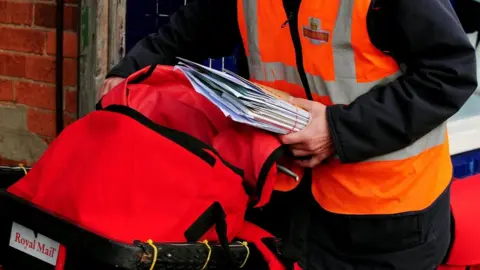Royal Mail: What’s gone wrong at the company?
 BBC
BBCJasmine Moulton's children have a series of complex medical conditions. On some days five-year-old Harper's skin allergies flare up so badly, her body has to be wrapped in bandages. Three-year-old Joshua has problems with breathing and swallowing. Both need regular hospital check-ups.
NHS Trusts contact Jasmine about medical appointments via letter. But in recent months these letters have either been late or don't arrive at all.
At the beginning of January this year, Jasmine received a call from the hospital to inform her that not only had both her children missed appointments, Joshua had missed a surgery which should have taken place in late December.
"And I was like, 'pardon?' And I was in a bit of shock. I explained that we hadn't had any post come through. She sounded shocked," Jasmine says.
As Jasmine talks, Joshua, who has a chest infection, lies on the sofa next to her. He coughs and wheezes. They had hoped the operation that he missed might have helped with his swallowing.
"It's just so frustrating. On top of being a mum to two children with..." Jasmine can't finish her sentence, she starts to cry. She is clearly exhausted.
"It stresses me out every day because I just think, how many other appointments have we missed? And just not knowing when we're going to be able to move on. And seeing him suffering."
Royal Mail says it is "not acceptable" that the NHS letters didn't arrive and apologised to the family.
The company's director of corporate affairs, Jenny Hall, said: "I've got young children myself and I know that must have been hugely stressful."

Royal Mail: Where's My Post?
For more on this story, watch Panorama on BBC One at 20:00 GMT on Monday, 26 February and on BBC iPlayer afterwards.
Reporter Zoe Conway speaks to Royal Mail insiders about problems facing the company and hears from its management about how proposed changes may help stave off multi-million-pound losses.

Four miles from Jasmine's home in Cheshire is Royal Mail's Winsford delivery office. On a weekday morning in early February, a steady stream of people turned up to collect undelivered letters.
One woman, who is recovering from cancer, was worried she had missed an NHS letter: "I'm expecting an appointment next month. If I miss it, it could be life threatening."
Another woman said she had collected a birthday card from her grandmother who had been upset to hear that it had failed to arrive on time. "She lives in Wales, I don't see her very often," she said.
Royal Mail says that it will investigate what has been going on at the Winsford delivery office as "a priority".
But it is not just in Cheshire that Royal Mail is struggling to deliver. Second class letters, which now cost 75p, should arrive within three working days. First class letters, which cost £1.25, should arrive the next working day. Ten years ago, 92% of first class post arrived on time. By the end of last year it was down to 74%, according to the regulator Ofcom.
In some places, the picture is even worse. In 17 postcodes between June and September 2023, more than a third of all first class post was late. In November Ofcom fined Royal Mail £5.6m for failing to meet its targets.

Under what is called the Universal Service Obligation, Royal Mail is required by law to deliver letters six days a week and parcels five days a week to every address in the UK.
Yet former and current Royal Mail staff have told BBC Panorama that at times letters have been left behind in sorting offices, while parcels and tracked items are prioritised for delivery.
Over the last two decades we have been sending fewer letters, while at the same time there has been big growth in parcels, largely due to the boom in online shopping. Parcel delivery is important for customers and represents a growing business opportunity.
One former Royal Mail area manager, who left recently and asked to speak anonymously, says he was so short-staffed that for weeks at a time he instructed postal staff to leave letters behind.
"You knew that you were letting customers down and there was no hiding from it," he says. Those decisions were taken in consultation with his managers, he adds.
He also says that senior management would have known that letters were being left behind while tracked items and some parcels went out because every delivery office in the country collects data daily on what is and isn't being delivered.
He says that data was collated and sent up the management chain to the top of the company. It was "impossible" that the top of Royal Mail didn't know this was happening as "everyone all the way up the chain was reporting those failures, was saying this is what we're prioritising".
Royal Mail says it is its job to ensure every letter and parcel is delivered on time because that is what customers have been promised.
"There are certain times of the year particularly, or where you've got resourcing issues like Christmas, where volumes double. And we can tell you that sometimes it's logistically necessary to move the parcels first. However, it should not be happening as a matter of course. What should not be happening is that sort of instruction," says Jenny Hall of Royal Mail.
 PA Media
PA MediaThe postal regulator, Ofcom, investigated the issue of parcel prioritisation last year. It said it had not found evidence of a "general organisation-wide policy directed by Royal Mail's senior management" of prioritising parcels over letters in "business-as-usual periods".
But it said it was concerned that there was "insufficient control, visibility and oversight" by senior management over the decision-making at delivery offices.
The failure to meet its delivery targets is not the only challenge facing Royal Mail. It is also losing money, with a loss of £419m last year.
It could save hundreds of millions of pounds if the obligation to deliver letters six days a week were watered down or if it were allowed to take longer to deliver letters.
Reform to the service now seems inevitable, with Ofcom recently setting out options for changes to the service that it says it wants to see publicly debated.
Many people have told the BBC that they see Royal Mail as a vital public service. The challenge then is how to square that with Royal Mail's need to turn a profit.
